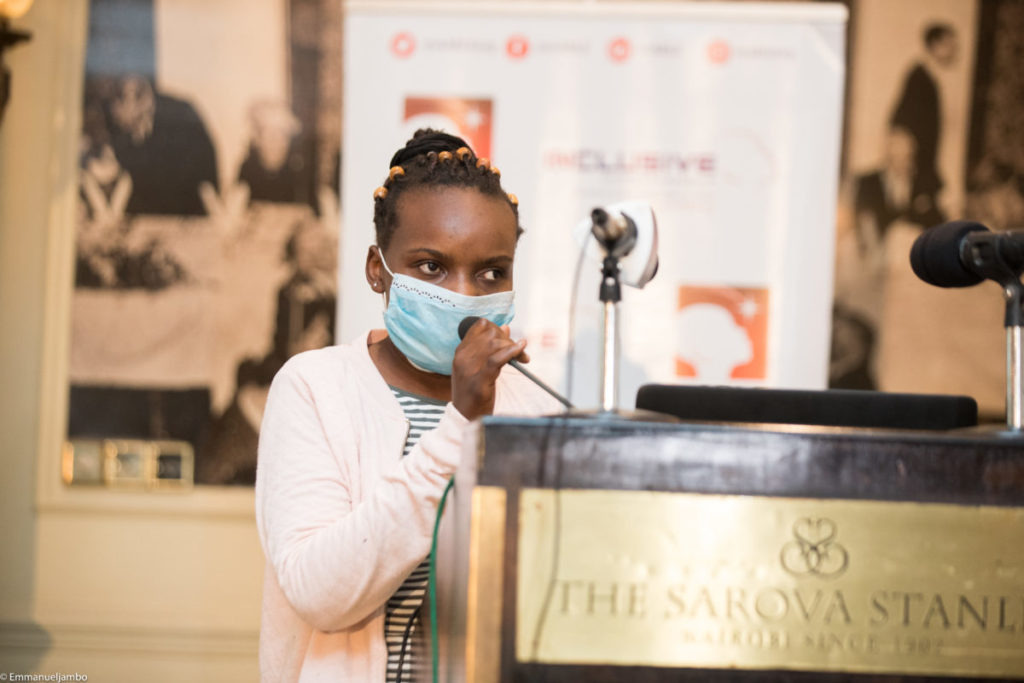Meet Nice: Setting her sights on international diplomacy despite blindness
inableAdmin

Nice Watetu began losing her sight when she was 12 years old; everything around her became dark, and she would injure her finger while fetching grass for her parents’ livestock in her remote village in Kangema.
Her deteriorating condition necessitated her to transfer to a special school where she could continue learning—albeit with the assistance of a braille machine. She first interacted with a braille machine and a computer loaded with special software at the Thika School for the Blind to enable her to learn programming.
“My vision began to blur, which was followed with difficulty in reading, and writing. When my teachers noticed that my eyesight was deteriorating, they encouraged me to enroll in a special school with computer lessons, where I was introduced to computer lessons,” she recalled.
Watetu, who is now 20, does not consider her condition to be a disability. She is able to perform any other skill that her peers are capable of using a computer, and then some. This is because, after graduating from high school, she enrolled in an internship with inABLE, where she received training on how to monetize the skills she has acquired over time, such as website design using Hypertext Markup Language (HTML) and Cascading Style Sheets (CSS).
The Google Chromebooks assistive technology computers include a special screen reader called ChromeVox that assists low vision or blind students in increasing their independence while using technology.
“I am currently specializing in web design; I can now conduct internet searches without the assistance of anyone. Let me say that I can do any task that anyone else can do on a computer,” she explained.
She plans to attend Mt. Kenya University in 2021 to study International Relations. Her second-best course, following Journalism, which she was advised not to pursue because some sections would be difficult for her to navigate.
She also aspires to be a politician in order to influence policy changes regarding the plight of people with disabilities. “I want to make sure that people with disabilities are catered for in areas that are often overlooked.”
Ms. Watetu was one of the visually impaired individuals who attended the first-ever Virtual Inclusive Africa Conference on October 8 and 9.
H.E. the First Lady of Kenya, Mrs. Margaret Kenyatta, as well as senior executives from Google, Safaricom PLC, M-Pesa, Equity Bank, KCB Bank, the Global Initiative for Inclusive ICTs (G3ict), Access Israel, the International Telecommunication Union (ITU), and Vodacom, attended the inABLE conference. The purpose of the conference was to discuss the effects of digital accessibility on employment, education, government services, and the private sector.
inABLE works with the Ministry of Education through a Memorandum of Understanding that grants them access to special schools for the blind where they convert classes to computer labs and bring in skilled manpower and hardware for the students’ benefit. In six special schools for the blind, inABLE has established eight assistive computer technology labs. In addition, InABLE has employed 15 assistive technology computer instructors and enrolled over 8,000 blind and visually impaired students and teachers.
“We are restricted to the students who attend the schools where we have established labs; our mandate is to provide learning that assists VI students in studying science-based courses. Some have even created apps that are for sale,” Catherine Mwangangi, inABLE Country Representative, explained.
Visually impaired people continue to face stigma in the country, and because the majority come from disadvantaged backgrounds, it is extremely difficult for them to access education due to the special devices needed to get through school.
“Many are also unable to reach their full potential because their teachers and caregivers are unable to assist them in meeting their needs, taking advantage of opportunities, and growing. There is also the assumption that no technology is available for them to use to advance their learning,” she added.
Guest contributor Wambui Chege wrote this blog after hearing inABLE Alumni Nice Watetu Macharia speak during the inABLE Media Breakfast that took place in advance of the 2020 Inclusive Africa Conference.